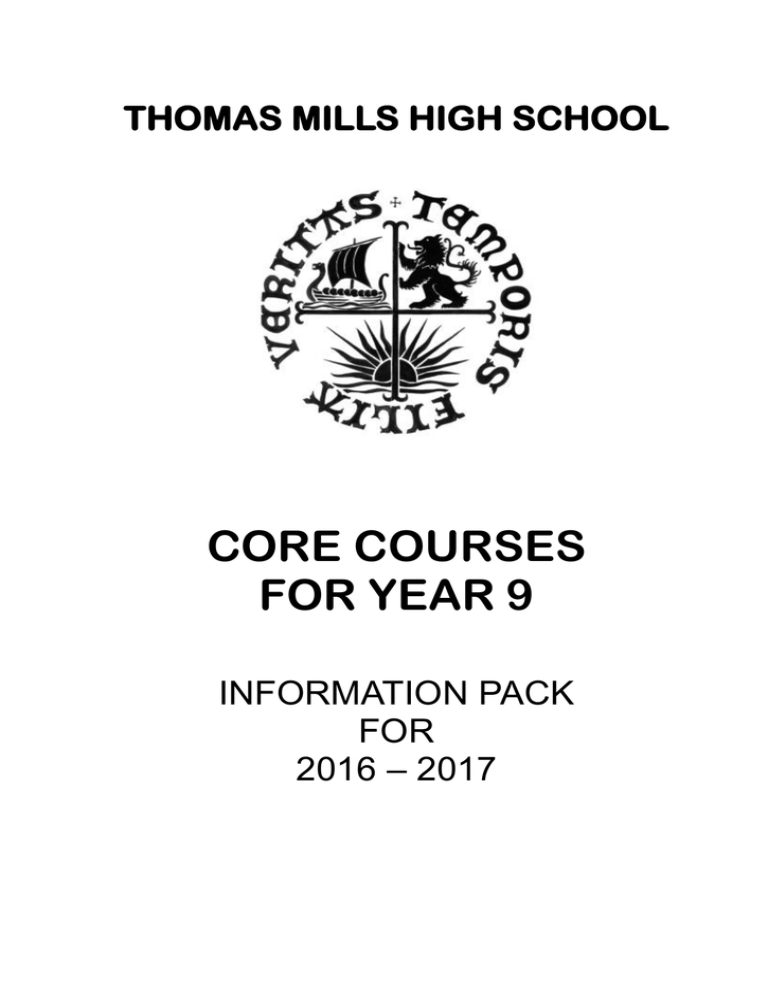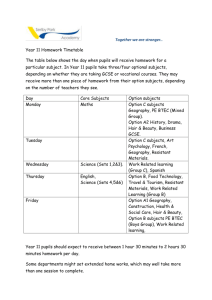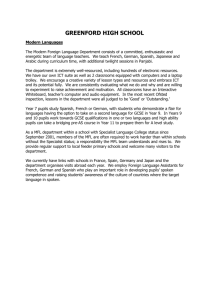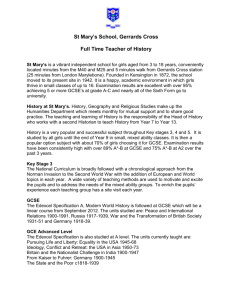Year 9 Core Curriculum 2016-17
advertisement

THOMAS MILLS HIGH SCHOOL CORE COURSES FOR YEAR 9 INFORMATION PACK FOR 2016 – 2017 COURSE CONTENT IS CURRENT AT THE TIME OF PUBLICATION, SPRING 2016. COURSE CONTENT MAY CHANGE PRIOR TO THE COMMENCEMENT OF COURSES. CORE COURSES FOR ALL PUPILS IN KS4 CONTENTS: Page Outline 3 GCSE Grading System 4 English Language & English Literature GCSE 5 Mathematics GCSE 6 Science GCSE 7 I.C.T. Functional Skills 8 P.E. and P.S.H.E. Non-Exam 9 R.S. Non-Exam 10 2 YEAR 9 CORE PROGRAMME 2016 All pupils will follow a core GCSE programme comprising: English Language English Literature Mathematics Separate Sciences in Biology, Chemistry and Physics or Double Award Combined Science The decision as to whether a pupil should take Double or Triple Award Separate Science will be taken at the end of Year 9. A Modern Foreign Language in either German or French (courses details are in the choices pack) A humanity in either Geography or History (courses details are in the choices pack). All core courses will be completed in Year 11 All pupils will also study Non-Exam PE/PSHE/Careers, RS and an ICT/Computing course. 3 GCSE Grading System The way in which GCSEs are graded has been changed and will no longer be graded from A* - G. This change has been phased in over several years, but you will have all of your GCSEs graded on the new system. The new system runs from 9 - 1, with a grade 9 being the highest grade. The table below shows an approximate comparison of the new grades to the old system. The grades are not directly equivalent, however, a new grade 7 is comparable with the bottom of an old grade A. New GCSE Grades Old GCSE Grades 9 A* 8 A 7 6 B 5 C 4 3 D E 2 F 1 G 4 ENGLISH LANGUAGE & ENGLISH LITERATURE Examining Board: AQA At Thomas Mills High School all pupils will study separate courses in English Language and English Literature. GCSE English Language The new English Language GCSE will encourage pupils to read a greater range of high quality, challenging literature and non-fiction texts from a range of genres and types (from the 19th, 20th and 21st centuries). Reading and writing will be equally weighted in the new English Language GCSE. The new English Language GCSE will have a greater focus on making sure that pupils are able to write clearly and accurately, in good Standard English. There will be an increased emphasis on spelling, punctuation and grammar including the use of vocabulary. Speaking and Listening will be assessed through endorsement. There will be a bigger emphasis on teaching pupils to become more confident in formal speaking. GCSE English Literature The new English Literature GCSE will encourage pupils to read a wide range of classic literature fluently with the assessment of: o A 19th century novel o A Shakespeare play o A selection of poetry since 1789 based on a central theme o British fiction or drama from 1914 onwards There will be increased assessment of unseen texts The quality of writing in the response to texts will be assessed Both GCSEs will be assessed at the end of the course in 2018 by examination. A new grading scale of 1-9 will be introduced with 9 being the top level. Tiers of papers for different level of entry will not exist. 5 MATHEMATICS Examining Board: AQA The GCSE in Mathematics to be examined from 2017 onwards has significant changes from the previous GCSE including new content, changes in emphasis and a different structure to some of the questions. The subject content is split into three groups: - content that all pupils should master (this is the biggest group) - content that should be taught but higher achieving pupil should master - content that will be taught only to higher achieving pupils and mastered by the highest achievers (those likely to go on to A-level study in maths) The new GCSE will have more focus on making sure that every pupil masters the fundamentals of maths. These have been defined by the DfE as areas such as calculation, ratio and proportion. The assessment objectives place more emphasis on reasoning and problem solving. A new grading system has been introduced. Grading will be on a nine point scale, with 9 being the highest available grade. The tiering structure will remain the same, with an overlap between the tiers at grades 4 and 5. This means that the Foundation tier will cover grades 1 to 5 and the Higher tier will cover grades 4 to 9 (level 5 now considered the benchmark pass grade). Both content and skills cover areas of the subject that we would all want young people to study. However, the additions mean that there will need to be more assessment time and greater commitment from pupils. 6 SEPARATE SCIENCE AND COMBINED SCIENCE Exam Board: OCR Specification: GCSE (9-1) Gateway Science Suite: GCSE Combined Science A (J250) GCSE Biology A (J247) Chemistry A (J248) Physics A (J249) Introduction: All pupils will study a common GCSE programme from year 9 to year 11 following either the Separate Science or Combined Science course. Formative internal assessments in year 9 and 10 determine the most suitable route through the course. Those following the Separate Science route will be in the best position to study Science at A level. Aims: Science is all around us and is needed to understand the universe, the world and everyday life. Our GCSE courses are chosen to help pupils make the links between theory and practice developing outstanding young scientists in Biology, Chemistry and Physics. Content (not yet finalised): Y9 Topic 1 Biology Topic 3 Y11 Topic 4 B1: Cell level systems B2: Scaling up B3: Organism level systems B4: Community level systems C1: Particles C2: Elements, compounds and mixtures C3: Chemical reactions C4: Predicting and identifying reactions and products P1: Matter P2: Forces P3a: Electricity P3b: Magnetism and magnetic fields P4a: Waves in matter P4b: Radioactive decay – waves and particles Chemistry Physics Y10 Topic 2 Topic 5 Topic 6 B5: Interaction between systems C5: Monitoring and controlling chemical reactions B6: Global challenges P5: Energy P6: Global challenges C6: Global challenges The new Gateway Combined Science A qualification contains a reduced proportion of the content outlined for Biology A, Chemistry A and Physics A. Examinations: These GCSEs are both linear with assessment at the end of the three-year course in year 11. The courses are 100% exam based with the complete removal of controlled assessments. Combined Science: 6 exams in total (2 exams per subject), each with a weighting of 16.7% Separate Sciences: 2 exams per subject, each with a weighting of 50% The current grading system, using A* to G, will be replaced by a numeric system, 9 to 1 (with 9 being at the top of the scale). The scheme of assessment will consist of two tiers: foundation tier and higher tier. Foundation tier assesses grades 5 to 1 and higher tier assesses grades 9 to 4. Practical requirements: The new GCSEs will require pupils to carry out a minimum of eight practical activities for each single Science and sixteen practical activities for Combined Science. Practical activities are embedded throughout the teaching topics. The development of practical skills is a fundamental and integral aspect of the study of any scientific subject which will help pupils throughout their course in preparation for the written examinations. Interest: If you find yourself asking questions such as ‘how does that work?’ or ‘why does my body do that?’ then Science is for you. Our aim in Science at Thomas Mills is to develop your interest and enthusiasm for Science and prepare you for the future world of science and technology that is constantly changing. 7 INFORMATION AND COMMUNICATIONS TECHNOLOGY – FUNCTIONAL SKILLS LEVEL 2 Examining Board: Scheme Code No: OCR 06779 Content: In order to use ICT effectively in everyday life, pupils must demonstrate that they can confidently apply, combine and adapt their ICT knowledge to new situations in their life and work. Pupils must also demonstrate that they understand the role that ICT plays in the world and use ICT in ways that enable them to function as effective citizens. Assessment: 100% examination at the end of year 9. Assessment will cover three skill areas including: Using ICT Systems Using ICT to find information Communicating information using ICT The assessment papers will be task-based. Skills: The course develops and builds upon existing ICT knowledge. It is practical as well as making pupils aware of the role and place of ICT in society. Correct at time of going to print but currently under review. 8 PHYSICAL EDUCATION (NON EXAM) Content: The core Physical Education course is designed to allow individuals the opportunity to develop their understanding and ability to perform a range of roles, in a variety of activities. Activities: Athletics Fitness Training Hockey Football Netball Trampolining Rugby Cricket Rounders Table Tennis Sports Leadership Tennis Badminton Basketball Dance Softball Skills: Individual performance skills will be developed, as well as cooperative, leadership skills and evaluation of performance. Interest: The Physical Education staff are keen to make the course as varied and enjoyable as possible. The emphasis will be on participation and pupils taking responsibility for their own and others development. PERSONAL, HEALTH AND SOCIAL EDUCATION + CAREERS Content: This subject is taught in a carousel during Years 9, 10 and 11. Individual topic areas include: Relationships Drug awareness Enterprise, financial capability and careers. Skills: Topic areas aim to foster responsible and informed attitudes and behaviour in young adults; and to develop skills that will equip people for their future working lives. 9 RELGIOUS STUDIES (NON-EXAM) Content: All pupils in Years 9, 10 and 11 will study this course. There are four main units covered:- Year 9 Commitment Here the pupils look at a variety of issues associated with theme life as a journey. They consider the legal ages that rights are gained, as well as birth, marriage, divorce and confirmation of religious belief ceremonies in a variety of religions. Community This is a new addition to the program and will encourage the pupils to think about the varying aspects of a community whether it be secular or religious. It will provide pupils with the opportunity to consider rules, order, justice and citizenship in active and engaging format. Messages from the Past This enables pupils to consider how we have gained information from the past, ranging from cave paintings to the Rosetta stone. The course also considers the mysteries of the Nazca lines while giving a detailed development of the Bible and other holy scripture. Judaism They explore the key beliefs and practices of the religion including the significance of holy books and festivals. They will also explore what it means to be a Jew in the modern world and the history of the faith. Year 10 Miracles This topic explores the varying definitions of miracles, as well as examples (modern and Biblical) and arguments for and against. The scheme is taught through key questions to ensure focus but also develop pupil exploration. The course is taught in an active and engaging way to help enthuse pupils. Arguments Against Religion Here pupils get the chance to look at and compare a range of psychological and sociological arguments against religion. Theorists include Marx, Freud and Durkhiem. Greek Scholars This provides a clear introduction to some of the scholars that are studied at AS level. Plato’s and Aristotle’s views of the soul and reality are compared. The pupils also get an opportunity to ask and answer a range of philosophical questions. Islam Not only does this topic explore the beliefs and practices of the religion but also deals with issues such as Islamophobia and the identity of Muslims in today’s society. The teaching is centred on the five pillars and tries to focus on the lives of young Muslims in the UK. Ethics in the Media This looks at the morality of advertising and the methods used to influence attitudes and behaviour. The course is very relevant and uses up to date resources to engage the pupils and encourage them to consider what is right or wrong and what boundaries should be set. Year 11 Ethics and Religion This enables pupils to focus on up to date and relevant ethical issue. The course very much focuses on what is in the news at the time but often considers medical ethics including stem cell research and fertility treatment, as well as war and crime and punishment. The lessons aim to encourage pupils to take an active interest in the world around them and formulate their own set of ethical beliefs. Paganism, Zoroastrianism and Baha’i The topics aims to give the pupils a taste of these lesser known religions, and compare and contrast their beliefs. Focus is on key concepts and practices as well as festivals and the way of life lived by these people. Wealth and Poverty Pupils are given the opportunity to reflect on the spread of wealth and what is fair, as well as considering way to address the issues and how being rich or poor fits in with religious ideas and teachings. Case studies, hot seating and role plays are used to encourage and empathetic and measured approach to subject. 10





